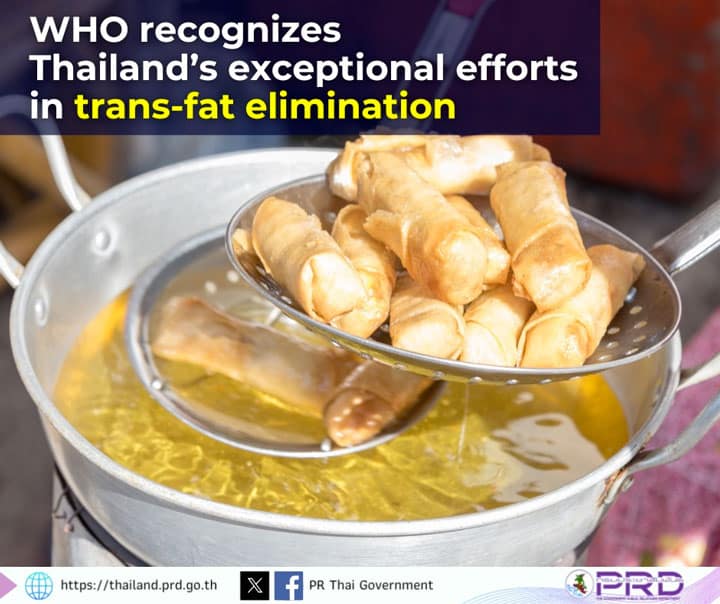Thailand awarded by WHO for pioneering fight against trans fats

The World Health Organization (WHO) recently recognized Thailand for its extraordinary efforts in the fight against trans fat.
This prestigious WHO certification program has named Thailand, along with Denmark, Lithuania, Saudi Arabia and Poland, as one of the top five countries performing exceptionally well in eliminating one of the major risk factors for non-communicable diseases. This recognition was given to Dr. Narong Aphikulwanit, a representative of the Thai Food and Drug Administration (FDA).
Trans fats have been linked by the WHO to coronary heart disease and increased death rates. These industrially manufactured trans fatty acids (TFA) are found in various foods such as baked and fried products, pre-packaged snacks, and certain types of cooking oils and fats used at home, in restaurants and in street food.
Since 2017, the Thai FDA has been committed to reducing and ultimately eliminating trans fat in food products. Several strict measures have been introduced, including a total ban on the production and sale of trans fats, as well as strict import regulations. In addition, there are ongoing educational campaigns to inform consumers about the health risks of trans fats.
These efforts by Thailand are an example of how national health initiatives can help improve public health and well-being. The WHO's recognition underlines the importance of such measures and the success Thailand has achieved in its quest for a healthier society, free from the harmful effects of trans fats.
About trans fats
Trans fats are a type of fatty acid primarily found in industrially processed foods. There are two types of trans fats: natural and artificial. Natural trans fats occur in small amounts in some animal products, such as meat and dairy. Artificial trans fats, also known as trans fatty acids, are created through a process called hydrogenation, in which hydrogen is added to vegetable oil to improve the shelf life and stability of food.
Artificial trans fats are harmful to health for several reasons:
- Increased LDL cholesterol: Trans fats increase the 'bad' LDL cholesterol in the blood, which can lead to blockage of the blood vessels.
- Reduction of HDL cholesterol: They lower the 'good' HDL cholesterol, which helps to remove cholesterol from the blood vessels.
- Heart disease: These changes in cholesterol levels increase the risk of coronary heart disease and heart attacks.
- Ignition: Trans fats can worsen inflammatory processes in the body, which is a risk factor for many chronic diseases, including heart disease.
- Insulin resistance: There is also evidence that trans fats can increase insulin resistance, which can lead to type 2 diabetes.
Because of these health risks, many countries have taken measures to limit or ban the amount of trans fats in foods. Reducing trans fats in the diet is an important step in improving public health and reducing the risk of chronic diseases.


Another story that is being sent into the world! And that is then accepted as truth by the higher authority.
That will probably be the case 'on paper', but in practice it is different!
I still see that the same amount of fried dishes are sold here! That is typical of Thai food culture (if you can call it that?)
As always if you can explain it well...
And what happens at a local level? There is some deep frying in Thailand and if you see what? Often long-used fats or oils, which you can easily see from the foam formation. These may not be trans fats, but they are dangerous to your health. The question is what kills Thais more quickly; bad fat, too much sugar or Lao Kao.
Two things that are often used in simpler Thai cuisine are: oil for frying almost everything and sugar.
I used to like to eat in a food court and also go to local restaurants with my wife. That has now changed. Because of the large amounts of sugar thrown into food and because almost everything is fried, I no longer feel like eating it. And then the eternal chili. I like spicy food occasionally, but does EVERYTHING have to be made spicy?
I wonder what the government does then? Remove trans fats from the oil used to fry everything?
The government may be doing something about it, but it does not change the fact that many Thais walk around with elevated blood sugar levels and I have already heard from many people that they have died from it.